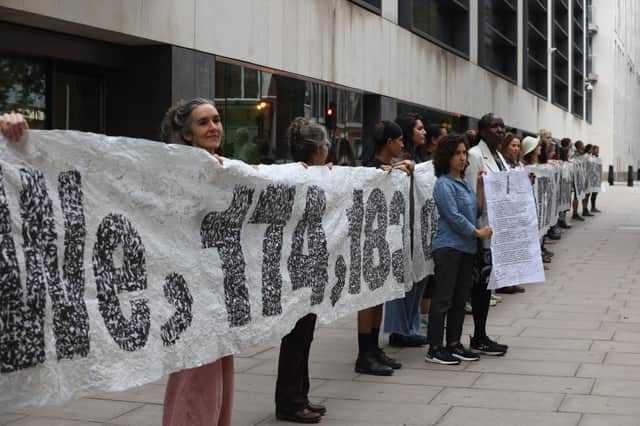Portsmouth has one of the highest allotment waiting lists in the UK – Greenpeace research


A Greenpeace investigation has revealed that there are nearly 175,000 applications for allotments stuck in waiting lists in England, with people in limbo for around three years on average, but some waiting as long as 15 years to be able to grow their own fruit and vegetables.
By sending freedom of information requests to every local authority in England, Scotland and Wales, Greenpeace found a total of 174,183 applications in waiting lists which have doubled in length since 2011.
Advertisement
Hide AdAdvertisement
Hide AdPortsmouth had the third highest waiting list, with 6,299, behind only Bristol City Council (7,630) and Sunderland City Council (7,293). Southampton City Council (6,164), Edinburgh (5,658) and Manchester City Council (5,516) completed the top six.
There are nine sites administered by Portsmouth City Council: Southampton Road, Cosham; Knowsley Road, Cosham; Salisbury Road, Cosham; Horsea Lane, Hilsea; Osier Close, Tipner; Burrfields Road, Copnor; Teignmouth Road, Copnor; Locksway Road, Milton and Durrants Road in Rowland’s Castle. Greenpeace say the new research shows people want to grow their own food as a way to improve their health, save costs on shopping and reduce their carbon footprint.
Daniela Montalto, Greenpeace UK forests campaigner, said: “Allotment waiting lists demonstrate a huge desire from people to be part of the solution to our broken food system. But without access to land, the many benefits of community food growing to people, nature and the climate are being stifled.
“The Government must support councils to act as well as take seriously its own role in creating systemic and lasting change to the food system.
Advertisement
Hide AdAdvertisement
Hide Ad“Crucial steps include proper support for farmers to transition to climate, people and nature-friendly farming as well as measures to reduce our climate footprint abroad including a ban on imports of soya and other agricultural commodities that drive deforestation in places like Brazil.”
Together with a group of artists, the campaigners created a 30-metre long seed paper banner embedded with seeds and ash from burnt out Amazon rainforest spelling out the message: “We the 174,183 demand allotments.”
They carried the banner to the Department for Levelling up, Housing and Communities along with a large letter urging the Government to expand access to allotments, which the department declined to accept, the volunteers said.
Allotments historian and lead artist for the project JC Niala said: “With the acceleration of climate change and the persistence of structural inequality within the UK and globally, food has become both an emblem and an embodiment of the troubles around us.
Advertisement
Hide AdAdvertisement
Hide Ad“Allotments quite literally provide a lifeline for some. They bring good local food back to people and take away the bad taste of the global industrial food system.
“They improve people’s mental health and wellbeing by creating a sense of purpose and increasing opportunities to connect with others as well as spend time in nature.”
The Department for Levelling up, Housing and Communities has been contacted for comment.